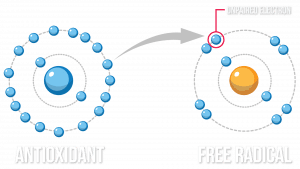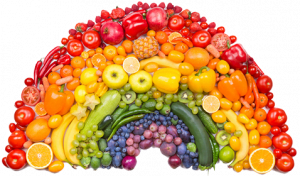“Antioxidant” is a word you’ve probably seen a lot. Take a stroll down any aisle at Whole Foods and their labels can’t help but mention it. In fact, there is a good chance your favorite health or juice drink likes to refer to the word, too. But as you start to notice how prolific the word is, you wonder, “Just what is an antioxidant? Is it another health fad or do antioxidants really have benefits?”
If you’ve always wondered about antioxidants and their many uses, read on to learn what an antioxidant is and how including it in your diet can boost your health.
So, What Is It?
An antioxidant is a compound found in food that stops/prevents cell damage. An antioxidant can be man-made but is easily found in its natural form in many foods such as tomatoes, various berries, and your daily cup of coffee. Antioxidants can also come in the form of essential vitamins like Vitamin A, C, and E. In addition to those vitamins, olive oil has many antioxidant properties. When olive oil is mixed with Carbon 60 to become C60OO (C60 in Olive Oil) it’s antioxidant properties become 172 times more powerful than that of vitamin C.
Interestingly, the word antioxidant didn’t always apply to the useful food compounds. In the 19th and 20th centuries, the term was originally used to describe any chemical that prevented oxidation. Oxidation is the process of oxygen bonding itself to another chemical. If you’ve ever seen rust on metal or a sliced apple turn brown, that’s oxidation.
Just as you would want to prevent the oxidation of metal so it won’t rust, you want to prevent the oxidation of your cells to prevent cell damage. Too much oxidation is called oxidative stress. This stress leads to feelings of tiredness, wrinkles on the skin, and other signs of aging. Without keeping oxidative stress in check, you make your body more susceptible to diseases like cancer.
Other Uses
During this time an antioxidant was mainly used to stop the corrosion of metal and strengthen rubber through vulcanization. But as the scientific community started to study antioxidants further, the term grew in meaning to include the stopping of animal and human cell damage. Antioxidants also started to be used in other areas such as preserving food and makeup products.
Before the use of an antioxidant, the best way to preserve plant-based foods and other perishable products usually involved storing them in a well sealed, dry, and dark place. However, this resulted in less flavorful foods. But with the introduction of antioxidants that blocked the effects of oxidation, food could now be preserved without losing flavor and taste.
Why All the Hype?
Okay, by now you might be thinking, “This sounds great and all, but why does every health food mention antioxidants? Are antioxidants the next bandwagon to jump on?”
It might seem that way, but an antioxidant can really do a lot for your health and fighting off disease. How? Well, it has to do with those little pesky things called free radicals.
To get a better understanding of free radicals, let’s first go through the makeup of an atom. Whenever you see a picture or gif of an atom you might have noticed layers of circles spinning around the center. These hula-hoop-like layers are called shells. When a shell fills up with enough electrons, another shell forms. If an atom has an incomplete outer shell with not enough atoms, it becomes unstable and searches for something to bond with. This is a free radical.
It’s important to note that free radicals are not all bad. They can be used within the body to help fight off invading diseases. But if the body has too many free radicals, they can set off a chain reaction that can lead to cell damage and the development of certain diseases. That’s where antioxidants come in.
An antioxidant can lend unstable atoms the electrons they need without becoming unstable themselves! With enough antioxidants, you can build a good defense against illnesses like diabetes and lessen the effects of aging.
The Best Sources of Antioxidants
While the body is able to make its own antioxidants, a healthy diet in antioxidant-rich foods is one of the best ways to boost your antioxidant levels. As we have mentioned before in our previous post, vegetables and fruits are a great way to get the antioxidants you need. The American Heart Association recommends “eating a rainbow,” by including veggies and fruits of many different colors in your diet.
Suppose it’s Taco Tuesday and you want to add a little taco to your dinner menu. Instead of adding in one color of bell pepper into the mix, try adding in two or more. Or maybe it’s a Friday night and you’ve been looking for a nice roast to start the weekend with. Add in assorted veggies to the roast like carrots, red onion, and some green or yellow zucchini to pump up your antioxidant intake.
“What if I’m not into meat?” If you’re looking to reduce your meat serving or want to omit the meat altogether, you can simply roast the veggies alone with a little olive oil and dash of your favorite seasonings to make your dinner a flavorful way to keep healthy.
You can do the same for dessert by enjoying mixed berry pies, or simply making a bowl of your favorite fruits. The goal is to include each color of the rainbow in your diet.
Are You Ready to Feel Better and Be Healthier?
If you’re looking for a quick boost and better, healthier life, try taking Carbon 60 in olive oil today. Many who have taken C60OO say it makes their usual workout routines easier to complete and leave them less winded at the end. To learn more about C60 Study.
Top 5 Antioxidants you should be taking
What Is an Antioxidant?| SES Research – Houston, TX




